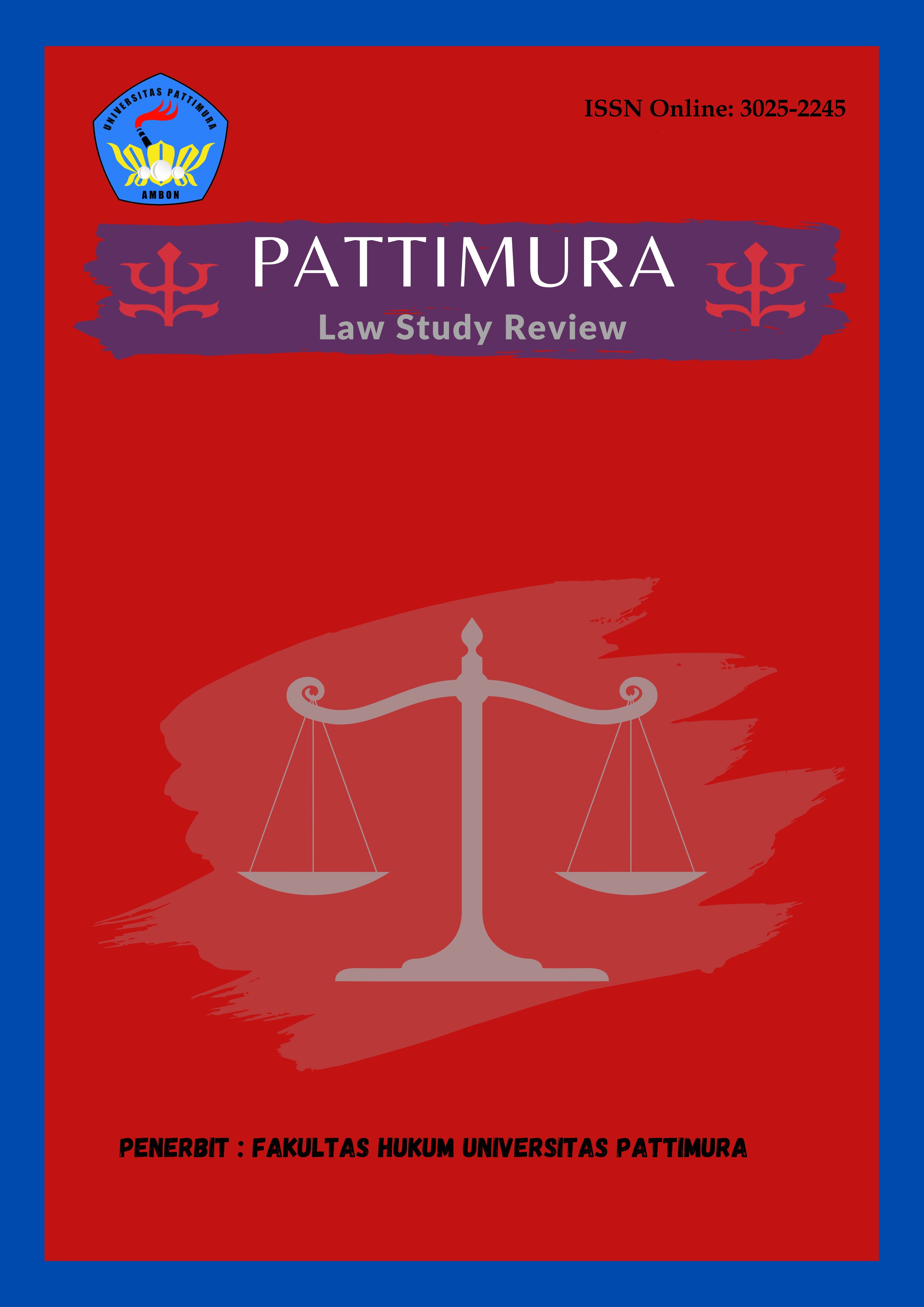Penetapan Mata Rumah Parentah Dalam Sistem Pemerintahan Adat
Abstract
The king of a traditional country is usually appointed and elected directly by the traditional community of the traditional country, usually there is one or more clans (fam) that are descendants of the king (mata ruma parenta). With the issuance of Ambon City Regional Regulation Number 10 of 2017 concerning the Appointment, Election, Inauguration and Dismissal of the Head of the Country Government (hereinafter referred to as Regional Regulation no. 10 of 2017), the traditional community through the Saniri Negeri determines the mata rumah parentah and is made in a country regulation. The research method used is normative legal research. The normative legal research method is a library legal research conducted by examining library materials or secondary data. This research was conducted in order to obtain materials in the form of theories, concepts, legal principles and legal regulations related to the subject of Language. The use of legal material sources consists of primary and secondary legal materials to discuss the formulation of the problem. The results of the study show that: (1) the determination of the house of the panrentah has been in accordance with the laws and regulations as per the Ambon City Regional Regulation Number 10 of 2017 concerning the appointment, election, inauguration and dismissal of the head of government. Which is procedurally implemented by the Saniri Negeri through a voting system. This system has also been regulated in the Central Maluku Regency Regional Regulation Number 04 of 2006 concerning guidelines for organizing the Saniri Negeri or the State Deliberative Body; (2) Law as a regulation of human behavior that is mandatory and must be obeyed. The legal consequences if the determination of the house of the parentah in a traditional country is the postponement of the election of the candidate for head of the state government (King).
Downloads
References
Dijk Van, Pengantar Hukum Adat Indonesia, Bandung: Mandar Maju, 1912
Firmandan, Hukum Adat Masyarakat Petapahan Dalam Pengelolaan Lingkungan Sebagai Upaya Pemenuhan Hak Masyarakat Adat, Jurnal Kajian Agama Sosial dan Budaya 2, no. 1, (2017):1 https://journal.iaimnumetrolampung.ac.id/index.php/jf/article/view/82/101
Garciano Nirahua dan Merlien Irene Matitaputty, Kewenangan masyarakat adat dalam pengelolaan sumber daya alam diwilayah laut Nuhu Evav, Bacarita Law Journal 2, no 2 (2022): https://ojs3.unpatti.ac.id/index.php/bacarita/article/view/8073/5250
Hadikusumo Hilman, Pokok-Pokok Pengertian Hukum Adat, Bandung: Alumni, 1980.
Jemmy Jefry Pietersz, Benjamin Carel Picauly, and Vica Jillyan Edsti Saija. “Sosialisasi Tentang Sistem Pemerintahan Adat Yapio Patai di Elpaputih, Kabupaten Seram Bagian Barat” AIWADTHU: Jurnal Pengabdian Hukum, 4, no. 1 (2024): 37 file:///C:/Users/user/Downloads/1937-5481-2-PB-1.pdf
Marzuki, Peter Mahmud Penelitian Hukum, Jakarta: Prenada Media, 2005.
Soekanto dan Soerjono Soekanto, 1981, Meninjau Hukum Adat Indonesia, Kembali oleh Soerjono Soekantor, Jakarta: Rajawali, 1981.
Soepomo, Kedudukan Hukum Adat di kemudian Hari, Jakarta: Pustaka Rakyat, 1952.
Sukamto, Meninjau Hukum Adat Indonesia, Suatu Pengantar Untuk Mepelajari Hukum Adat, Jakarta: Raja Grafindo Persada, 1996.
Syahbandir, Mahdi. "Kedudukan Hukum Adat dalam Sistem Hukum." Kanun Jurnal Ilmu Hukum 12, no. 1 (2010) : 4 file:///C:/Users/user/Downloads/6285-13102-1-SM-1.pdf
Wignjodipoero Soerojo, Pengantar dan asas-asas hukum adat, Jakarta: Haji Masagung, 1983.
Copyright (c) 2025 Welfri Sarimanella, Jemmy Jefry Pietersz, Garciano Nirahua (Author)

This work is licensed under a Creative Commons Attribution-NonCommercial 4.0 International License.
Authors who publish their manuscripts in this Journal agree to the following conditions:
- The copyright in each article belongs to the author, as well as the right to patent.
- Authors are able to enter into separate, additional contractual arrangements for the non-exclusive distribution of the journal's published version of the work (e.g., post it to an institutional repository or publish it in a book), with an acknowledgment of its initial publication in this journal.
- Authors are permitted and encouraged to post their work online (e.g., in institutional repositories or on their website) prior to and during the submission process, as it can lead to productive exchanges, as well as earlier and greater citation of published work.
- Authors have the right to self-archiving of the article (Author Self-Archiving Policy)













